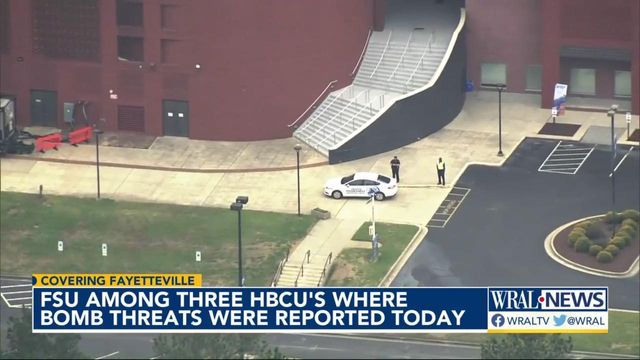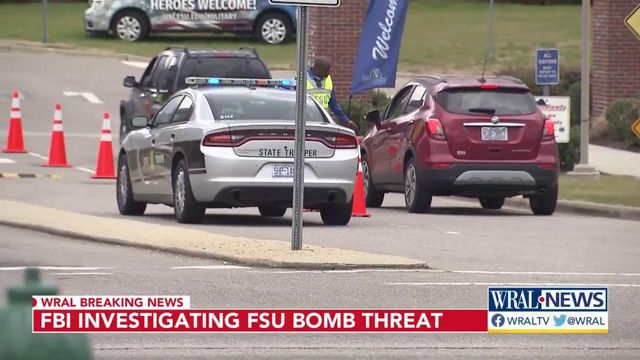Bomb threats reported at 2 HBCUs in North Carolina, classes to resume Thursday at FSU
Though no devices were found at the schools threatened so far, "people of color don't have that privilege to think it's not real," said Lance Wheeler, director of exhibitions at the National Center for Civil and Human Rights in Atlanta.
Posted — UpdatedClasses will resume at Fayetteville State University Thursday after a bomb threat paused all on-campus activity.
Campus operations, including classes, were suspended at FSU until further notice, according to a release from the school. After the threat was received, university police closed all exits for entering campus, except for the main exit on W.T. Brown Drive. University employees and commuter students have been asked to leave campus, while residential students should shelter in place.
University leaders said law enforcement are conducting sweeps of buildings and grounds to find devices that may be in suspicious packages or hidden on campus.
FSU's basketball game was also moved to Methodist University on Tuesday night.
The FBI on Wednesday was investigating a bomb threat at Fayetteville State University, Winston-Salem State University and third threat against Claflin University in South Carolina. It is the latest in a string of threats against historically Black colleges and universities.
Through Feb. 7, the FBI had recorded threats against 17 institutions across the country.
"It is not an accident it is happening during Black History Month. We have heart time and time again voices speaking out against all Americans knowing Black history and knowing the experience of African Americans," said Adriane Lentz-Smith, a professor and historian at Duke University.
A spokeswoman told WRAL News it was too soon to say whether the threat at FSU was connected.
"I am deeply disturbed by the recent reports of senseless bomb threats directed at HBCUs across our nation and particularly at Fayetteville State University today," said FSU Chancellor Darrell T. Allison in a statement.
The FBI said the hate crimes probe involves more than 20 field offices and “is of the highest priority." Investigators have identified at least five “persons of interest,” a law enforcement official told The Associated Press.
"The FBI takes all threats seriously, and we are committed to thoroughly and aggressively investigating these threats. We would like to remind members of the public that if they observe anything suspicious or have information about potential threats to report it to law enforcement immediately, call 1-800-CALL FBI or submit a tip to tips.fbi.gov," FBI spokeswoman Shelley Lynch said.
Lentz-Smith said it's important that investigative resources focus on who is making the calls.
"It is not just about self-help. It is about holding people who do these things accountable and making sure the boarder community says out loud this can't stand and we will stand with you to keep it from happening," she said.
In one of the cases, a caller claiming to be affiliated with the neo-Nazi group Atomwaffen Division described a plot at Bethune-Cookman University in Florida involving seven bombs hidden in bags, Daytona Beach Police Chief Jakari Young said.
University campuses are considered “soft targets,” but “they’re not as soft as they used to be,” said Robert McCrie, a professor at the John Jay College of Criminal Justice in New York. Universities have traditionally been easily accessible to the public, but many hardened their security after the Sept. 11, 2001, terror attacks. Now, picture IDs are needed to enter buildings on McCrie’s campus and others, he said.
Though no devices were found at the schools threatened so far, “people of color don’t have that privilege to think it’s not real,” said Lance Wheeler, director of exhibitions at the National Center for Civil and Human Rights in Atlanta.
The Congressional Bipartisan HBCU Caucus' statement on the latest bomb threats recalled 1969 racial segregation protests at North Carolina A&T that prompted an armed response by the National Guard and police. One student was killed, dozens injured and more than 300 people arrested as gunfire was exchanged from campus buildings. The protests followed the first sit-in at a whites-only lunch counter by four Black men, later known as the Greensboro Four.
“We know from history that in spite of external threats, HBCUs are resilient institutions that will persist through all forms of adversity," the statement said.
Universities in Arkansas, Delaware, Florida, Georgia, Kentucky, Louisiana, Maryland, Mississippi, and other states targeted since the start of 2022 have resumed operations since the lockdowns. But many still worry about future threats and efforts to prosecute those responsible.
Maurice Mitchell, national director of the Working Families Party and strategist for the Movement for Black Lives, said HBCUs and independent Black institutions are targeted because they represent independence and resilience for African Americans, which is a threat to a white supremacist ideology.
“The mere existence of Black schools, Black churches, Black political organizations and Black business are a threat,” he said. “We see upswings in these attacks as backlash to Black resistance, the exercising of independent Black political power, the influence of Black social movements.”
The attacks are “ways to try to put fear into communities that are trying to obtain freedom," Wheeler said.
Related Topics
• Credits
Copyright 2024 by WRAL.com and the Associated Press. All rights reserved. This material may not be published, broadcast, rewritten or redistributed.






